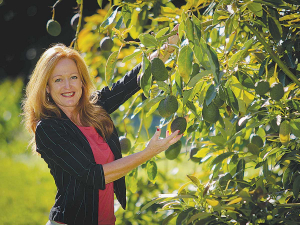Avo growers getting smashed
New Zealand Avocado chief executive Brad Siebert says avocado growers are facing increasing cost pressure across all areas of their business.
 During her 10-year helm at Avocado NZ Jen Scoular and her team have helped guide the industry's value growth from $68 million in 2011 to a forecast $200m in 2021.
During her 10-year helm at Avocado NZ Jen Scoular and her team have helped guide the industry's value growth from $68 million in 2011 to a forecast $200m in 2021.
New Zealand Avocado chief executive Jen Scoular has overseen the industry almost treble in value during the past 10 years.
Scoular recently completed her 10th year as head of industry-good organisation NZ Avocado. She and her team have helped guide the industry's value growth from $68 million in 2011 to a forecast $200m in 2021.
She told Hort News that another achievement for her and the team was gaining crown funding for the first horticulture Primary Growth Partnership (PGP) to enable a step change in the industry. Scoular adds that NZ winning the rights to host the 2023 World Avocado Congress is another feather in her team's cap.
She says the industry has also worked collaboratively to gain market access and to start exporting to China and India, two of the world's largest economies.
Scoular has helped raise visibility of the avocado industry, resulting in the Prime Minister opening its conference in 2018, and significant further crown investment.
The industry harvested almost 44,000 tonnes of avocados this season, exporting over 5 million trays. Local sales will top 2.7 million trays. New Zealand has over 4,000 hectares of avocado trees in production with a further 1,000 hectares recently planted.
All avocados sold in New Zealand are homegrown, however, supply volumes fluctuate during the year which can create price fluctuations for some consumers.
Scoular explains that the main New Zealand avocado harvest runs from June to March. There is a low supply of avocados in New Zealand throughout autumn and winter as these months are outside of the main avocado harvest season.
"As with all fresh produce, prices fluctuate throughout the season depending on supply and demand. Avocados trees have a propensity to suffer from irregular bearing, so our total crop can vary quite significantly from one season to the next," Scoular told Hort News.
"Avocados are a natural super food containing 19 different vitamins, minerals and phyto-nutrients," she says.
"Avocados originate in Central America, with much warmer, dryer and less windy climates than we have in New Zealand. Growers need to manage the environmental conditions to produce the delicious avocados consumers love to eat. But mother nature does play a big part in avocado seasonality and supply."
Scoular says food safety and traceability are crucial to the success of the industry.
The NZ avocado industry has mandatory systems that all growers, packers and exporters must comply with relating to food safety, traceability and quality throughout the supply chain.
An orchard management system called Avogreen is mandatory to all export avocado growers in New Zealand.
Scoular notes that the NZ avocado industry has the highest fruit maturity in the world, therefore growers wait for the best maturity before picking resulting in a creamier taste profile.
"New Zealand's unique profile combination of soils, temperatures and sunshine hours results in avocados with a slightly different nutrient profile," she explains. "NZ grown avocados have higher levels of B vitamins and folate than other avocados grown throughout the world."
Like many NZ growers, avocado growers are also facing the brunt of Covid-19.
Scoular says, in 2020, all exporters faced challenges with sea and air-freight disruption caused by the impacts of Covid-19 around the world.
"Avocados are highly perishable fresh produce, therefore delays in the supply chain can have serious impacts," she told Hort News.
"New Zealand has seen significant investment into new avocado plantings over the past five years and one of the welcome challenges we collectively have as an industry to do develop markets to ensure there is a home for this fruit."
Why Avos?
Avocados have 19 vitamins and nutrients, including those necessary for a healthy immune system.
Jen Scoular says an increased focus from consumers on health and wellness has contributed to the growth seen across global avocado consumption.
The world's avocado industry is facing challenges with sustainability, due to the widely reported environmental and social impacts of avocado growing in South American countries, she adds.
"While New Zealand's avocado growing practices are far more sustainable than those of our South American counterparts, growers acknowledge that there is still room for improvement," Scoular told Hort News.
"As an industry we are embarking on an avocado sustainability journey and we are prepared to review and change practices where it is identified that more positive outcomes could be achieved."
Changed logos on shirts otherwise it will be business as usual when Fonterra’s consumer and related businesses are expected to change hands next month.
Reflecting on the past year, Horticulture New Zealand chief executive Kate Scott says there has been a lot to celebrate.
Ministry for Primary Industries (MPI) Director General Ray Smith is giving a big shout-out to the horticulture sector, especially kiwifruit.
Early forecasts for New Zealand's apples and pears point to a standout season marked by exceptional fruit quality and high pack-out rates.
Tickets are now available for Beef + Lamb New Zealand’s (B+LNZ) Out the Gate, returning from 19-21 May 2026 at Te Pae, Christchurch.
Dairy Women's Network (DWN) is welcoming AgriHealth as a new partner.

OPINION: Here w go: the election date is set for November 7 and the politicians are out of the gate…
OPINION: ECan data was released a few days ago showing Canterbury farmers have made “giant strides on environmental performance”.